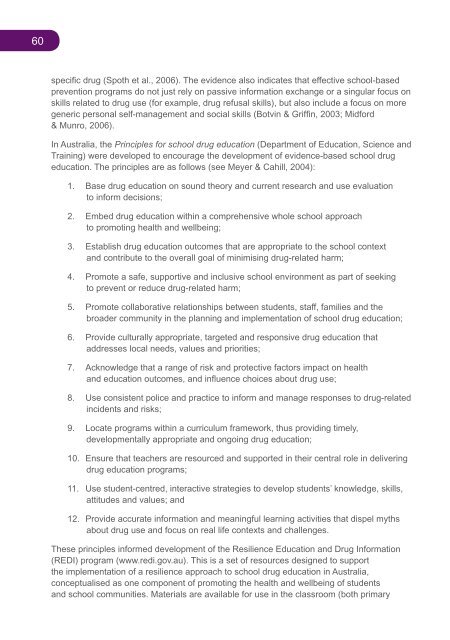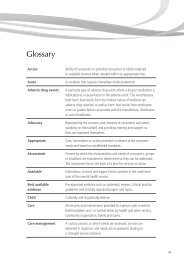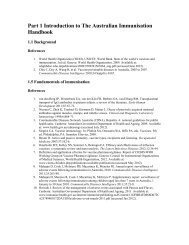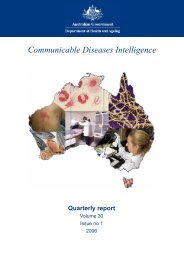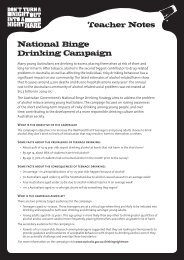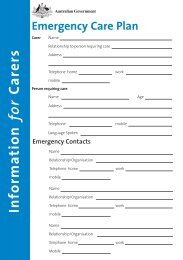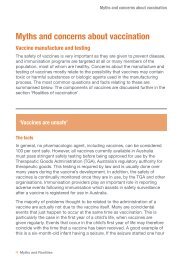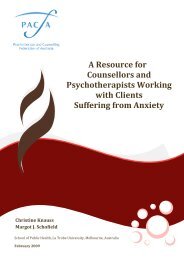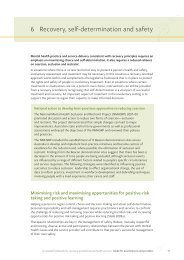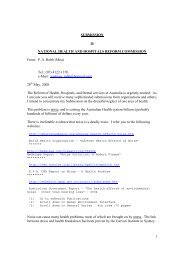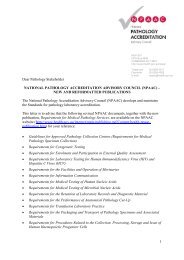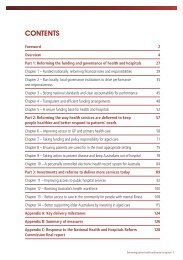National Amphetamine-Type Stimulant Strategy Background Paper
National Amphetamine-Type Stimulant Strategy Background Paper
National Amphetamine-Type Stimulant Strategy Background Paper
Create successful ePaper yourself
Turn your PDF publications into a flip-book with our unique Google optimized e-Paper software.
60<br />
specific drug (Spoth et al., 2006). The evidence also indicates that effective school-based<br />
prevention programs do not just rely on passive information exchange or a singular focus on<br />
skills related to drug use (for example, drug refusal skills), but also include a focus on more<br />
generic personal self-management and social skills (Botvin & Griffin, 2003; Midford<br />
& Munro, 2006).<br />
In Australia, the Principles for school drug education (Department of Education, Science and<br />
Training) were developed to encourage the development of evidence-based school drug<br />
education. The principles are as follows (see Meyer & Cahill, 2004):<br />
1. Base drug education on sound theory and current research and use evaluation<br />
to inform decisions;<br />
2. Embed drug education within a comprehensive whole school approach<br />
to promoting health and wellbeing;<br />
3. Establish drug education outcomes that are appropriate to the school context<br />
and contribute to the overall goal of minimising drug-related harm;<br />
4. Promote a safe, supportive and inclusive school environment as part of seeking<br />
to prevent or reduce drug-related harm;<br />
5. Promote collaborative relationships between students, staff, families and the<br />
broader community in the planning and implementation of school drug education;<br />
6. Provide culturally appropriate, targeted and responsive drug education that<br />
addresses local needs, values and priorities;<br />
7. Acknowledge that a range of risk and protective factors impact on health<br />
and education outcomes, and influence choices about drug use;<br />
8. Use consistent police and practice to inform and manage responses to drug-related<br />
incidents and risks;<br />
9. Locate programs within a curriculum framework, thus providing timely,<br />
developmentally appropriate and ongoing drug education;<br />
10. Ensure that teachers are resourced and supported in their central role in delivering<br />
drug education programs;<br />
11. Use student-centred, interactive strategies to develop students’ knowledge, skills,<br />
attitudes and values; and<br />
12. Provide accurate information and meaningful learning activities that dispel myths<br />
about drug use and focus on real life contexts and challenges.<br />
These principles informed development of the Resilience Education and Drug Information<br />
(REDI) program (www.redi.gov.au). This is a set of resources designed to support<br />
the implementation of a resilience approach to school drug education in Australia,<br />
conceptualised as one component of promoting the health and wellbeing of students<br />
and school communities. Materials are available for use in the classroom (both primary


